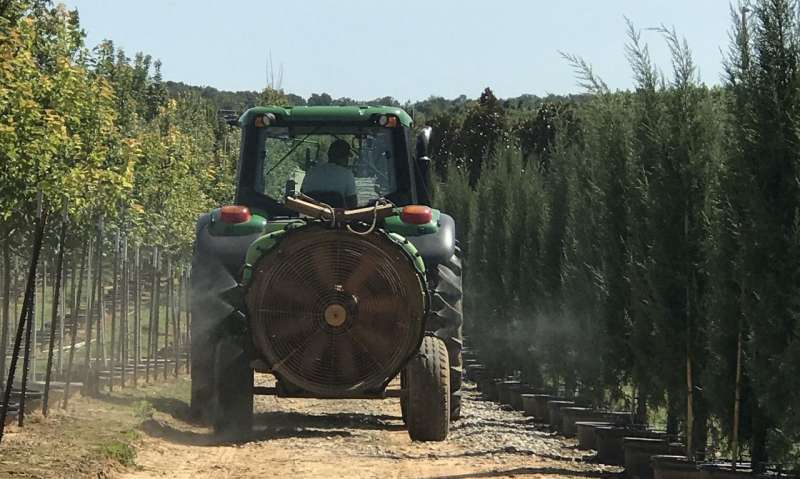Look closely at this spray rig at the Hale and Hines Nursery in Warren County, Tennessee. The pesticide application is barely visible. The sprayer was retrofitted with an intelligent sprayer for a demonstration. The new technology will allow producers to significantly reduce the amounts of pesticides they apply to nursery crops, saving costs and environmental impacts. Credit: A. Fulcher, UTIA
Producers of landscape trees, shrubs, vines and perennials, all of which are known as nursery crops, are poised to adopt an industry-wide change that will benefit all of society. Researchers with the University of Tennessee Institute of Agriculture are among the agricultural scientists to help test a newly developed technology that will allow producers to use significantly reduced amounts of pesticides to produce their crops.
The technology involves revolutionary new sprayer technology that utilizes a laser, sensors and variable-rate nozzles along with a complex algorithm that allows the sprayer to "see" a plant, detect its size, shape and density and then apply just the right amount of pesticide needed in real-time. Called intelligent spray technology, nursery owners can soon purchase equipment that can reduce their pesticide costs by as much as $230 per acre of production per season. Better yet, the technology is already available as a retrofit to their existing spray equipment, thus reducing initial costs to employ the technology.
Not only will intelligent spray technology save producers thousands of dollars, it will reduce the amount of future pesticides applied across the environment by untold amounts. Nationally, nursery production contributes more than $4.2 billion to the economy.
"This is a great example of multistate and multidisciplinary research that is leading to transformative changes in agriculture," says Amy Fulcher, an associate professor in the UT Department of Plant Sciences. Fulcher's area of expertise is sustainable ornamental plant production and landscape management. Along with David Lockwood, a professor in plant sciences, Fulcher spearheads UTIA's participation in this USDA National Institute of Food and Agriculture effort which is made possible through the Specialty Crop Research Initiative.
Work on the first of two grants began in 2009, with the second grant funding research from 2015—2020. When completed, UTIA's efforts will have amounted to nearly $435,000. Also participating in the study are Lauren Fessler in the UT Department of Plant Sciences and Wesley Wright in the UT Department of Biosystems Engineering and Soil Science. Scientists from other states with large nursery, fruit or nut production industries, including The Ohio State University, Oregon State University, Clemson University and Texas A&M University, are also involved in the project. Heping Zhu, USDA-ARS, is coordinating the overall project.
In recent studies applications made by the intelligent sprayer in April, May and June, as trees became increasingly more dense, reduced pesticide volume by 70, 66, and 65 percent compared to a 50-gallon per acre application. Although the growing season has come to a close for 2018, plant production and maintenance continues year round. "When the plants are dormant we see magnified savings," says Fulcher. The research indicates that during dormant oil applications one-fifth to one-eighth the volume of pesticides are applied using the intelligent spray technology. A stated goal at the outset of the project was to reduce overapplication and uncertainty associated with current pesticide delivery systems used in specialty crop production.
Additional results from testing the technology indicated that drift from pesticide applications can be reduced by as much as 87 percent and spray loss to the ground by 63 percent to as much as 93 percent, all without losing pesticide efficacy.
In Tennessee retrofitted sprayers are being tested at Hale and Hines Nursery in Warren County and Oren Wooden's Apple House in Bledsoe County.
"Seeing the technology in action is really interesting," says Fulcher. "Every time I demo it for groups of Extension agents or growers, immediately they are quiet and start videoing it with their phones. I have literally heard a gasp from a crowd of nursery producers when they saw the cloud of pesticide emerge from a traditional airblast sprayer and move across the field compared with the visibly much lighter, more targeted application from the prototype sprayer."
Nursery producer James Hines agrees. "Every time I look back and see the tips snapping on and off, I think it is the coolest thing ever! It's probably saved us 60 percent on chemicals with as good or better control. It hits every plant and nothing else," he says.
Smart Guided Systems, a precision farming supplier, was recently licensed to commercialize the technology and is taking pre-orders from producers for retrofit kits that will be available in February.
Fulcher believes the new spray technology has implications beyond nursery production. "I really believe the technology is going to revolutionize pesticide application across agriculture," she says.
In October, Fulcher hosted a demonstration of the technology in action at Hale and Hines Nursery during an industry educational tour at the International Plant Propagators' Society Southern Region Annual Conference in Chattanooga, Tennessee.
Provided by University of Tennessee Institute of Agriculture























